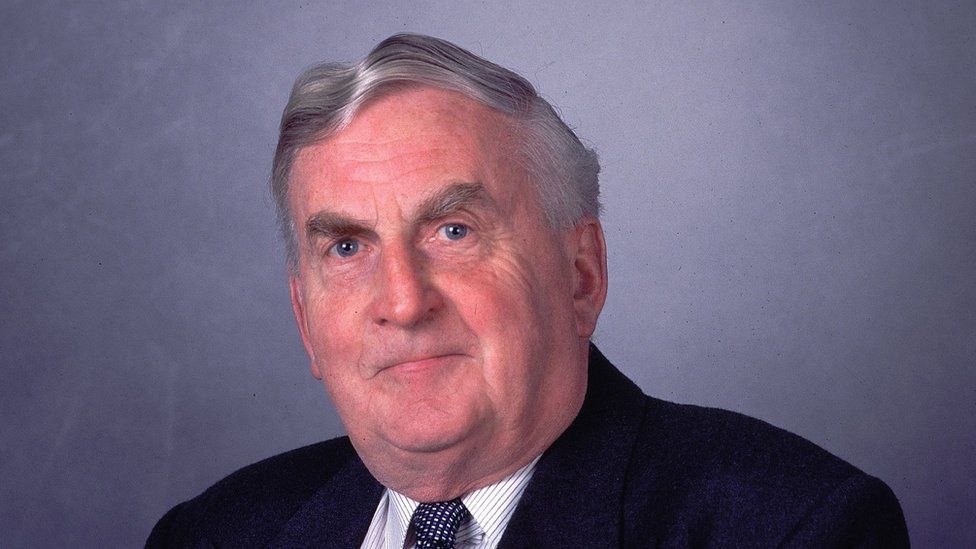
Lord Morris, as John Morris, became the longest serving MP in Wales
By Adrian Browne
BBC Wales political reporter
The former Cabinet minister and Welsh Labour MP Lord Morris of Aberavon has died at the age of 91.
John Morris served in the cabinets of three Labour prime ministers – Harold Wilson, Jim Callaghan and Tony Blair.
A former Welsh secretary and attorney general, he became Wales’ longest-serving MP after representing Aberavon for more than four decades, from 1959 to 2001.
Paying tribute to Lord Morris, Eluned Morgan, Welsh minister for health, said she was “very sad” to hear the news.
BBC broadcaster Huw Edwards described Lord Morris as “one of the most distinguished Welshmen of his time” and “one of the fathers of devolution”.
Lord Morris entered government as parliamentary secretary at the Ministry of Power between 1964 and 1966 in the Wilson administration, later moving to the Ministry of Transport and becoming minister of defence (equipment) in 1968.
In 1974, when Labour returned to power after nearly four years in opposition, he was appointed Welsh secretary and had the task of taking the party’s ill-fated original devolution legislation through a hostile House of Commons.
‘Elephant on the doorstep’
An emphatic ‘no’ vote of nearly 80% in the 1979 referendum followed the industrial and economic turmoil of what became known as the winter of discontent.
Hearing the vote results, Lord Morris pronounced that when “you see an elephant on the doorstep you can’t ignore it”.
The Labour government, led by Jim Callaghan for the previous three years, was soon swept from power.
Lord Morris, in 2018, explaining why he backed air strikes on Syria
Lord Morris, a barrister, QC and Welsh speaker, returned to high office as government attorney general, or chief legal adviser, in 1997, following Tony Blair’s first landslide victory.
He held that post for two years.
One of the main issues he faced as attorney general was the involvement of UK forces in Nato airstrikes against Serb forces in 1999.
Looking back on the period, Lord Morris said: “I had to authorise air attacks in Kosovo on a daily basis according to what I thought was the right way of doing it without UN Security Council approval.
“We were breaking new ground. But when you have ethnic cleansing on the scale you had in Kosovo, when thousands and thousands of people are moved from their homes because of their background, religion and ethnicity, then something has to be done.
‘You’ve got to do something’
“I took a very simple view.
“If there’s a burglar attacking your home and raping members of your family, and the police constable won’t intervene, there’s no time to go to the chief constable, or to the standing joint committee, you’ve got to do something otherwise it’s too late.
“And some of us, although we were only children, remember the Holocaust and the background of ethnic cleansing in the past, it still haunts us even though we were not there, to realise what was happening.”
In the early months of the new Blair government a second devolution referendum paved the way for the creation of a Welsh assembly, which later became the more powerful Senedd Cymru.
Image source, Wales Office
Lord Morris with eight other former Welsh secretaries at a celebration marking the 50th anniversary of the post in 2014
In 2015, Lord Morris told a television documentary that there had been “very little difference” between the law that established the assembly and the one he steered through Westminster in 1978.
“New work wasn’t needed and that’s how the measure was prepared so quickly,” he said.
“My fingers were on the strings of that harp from beginning to end.”
‘A true friend’
Lord David Wolfson of Tredegar KC said he was “deeply sorry” to hear the news.
“We discussed the history of Jews in South Wales and especially Tredegar – and he kindly gave me a volume on the topic,” said Lord Wolfson.
On Twitter, Aberavon Labour added that the news had been met with “great sadness” by the group.
Pedr ap Llwyd, chief executive of the National Library of Wales, said Lord Morris was a “true friend” of the library.
“Our heartfelt condolences go out to Lady Morris and her family. We will surely miss his presence at the library.”








